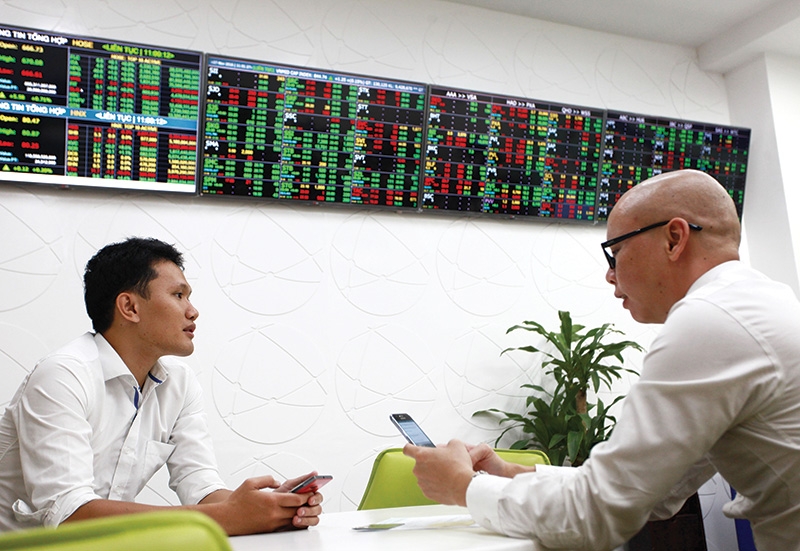Barriers hinder activity in Vietnam’s derivatives
 |
| Creating a robust legal framework for derivatives in Vietnam is an uphill, but neccessary, task Photo: Le Toan |
According to the Hanoi Stock Exchange (HNX), as of July 31, 78,445 trading accounts have been opened in the Vietnamese derivatives market, almost twice as many as in the same period last year. The volume of open interests increased 2.5 times from 8,077 contracts at the end of 2017 to 20,494.
The Stock Exchange of Singapore has revealed intent to co-operate with its local counterpart to develop derivatives products on Vietnamese stocks, which will be listed on the Singapore exchange to serve as an investment and risk-hedging tool for foreign investors, demonstrating the huge potential of the fast-growing segment.
However, unlike other developed countries where institutional investors account for a larger share of trading, Vietnamese individual investors, made up 91.15 per cent of the total trading volume at the end of July. The remainder consists of institutional and foreign investors at 1.54 and 0.58 per cent, respectively.
A fund management company’s representative told VIR that legal restrictions on investment activities, which were often introduced long before derivatives were launched in Vietnam, are the biggest obstacles.
“If institutions want to be part of the game, they need approval from the government, particularly from the Ministry of Finance and the State Securities Commission of Vietnam (SSC). Getting the legal framework up to speed will be a burdensome task because the government will have to amend many regulations to help investors turn a profit and not just prevent risks,” the representative said.
Although there are some regulations supporting institutional and foreign investors, such as Decree No.60/2015/ND-CP, non-Vietnamese and retail players still find many restrictions barring them from joining this market.
At the end of October 2018, Vietnam Investment Fund Management JSC (VFM) was ordered to pay VND175 million ($7,600) by SSC to settle allegations of breaching regulations on derivatives investment. VFM explained its activities were only for research and testing purposes since it prepared to launch a new risk-hedging product, but the decision was upheld. This discouraged many institutions from pouring money into Vietnam’s derivatives options.
Also keeping investors from the market is the necessary establishment of the escrow account and depositing the escrow. While investors want more access and more rights to control their trading activities, there is still no rule allowing them to do so. Plus, since international banks are listed as members in Vietnam’s derivatives market, investors find it unnecessary to deposit cash in an unsegregated account with one of the Vietnamese brokerages.
According to Kevin Snowball, chief investment officer of PXP Asset Management Ltd., the custodian infrastructure for derivatives in Vietnam is not developed enough to accommodate foreign and institutional investors.
Meanwhile, Tran Anh Dung, director of capital market strategy at VNDIRECT Securities Corporation told VIR, “The most important action is to tackle long-standing challenges of foreign ownership limits for overseas capital. Some solutions to remove barriers and broaden market access need to be implemented, such as non-voting depositary receipts.”
In addition to the policy environment, experts also urged caution about the low efficiency and high risks associated with trading derivatives products because prices can go up and down in a matter of minutes, which may confuse investors. The Washington Post even called this “the exotic financial products that nearly crippled the economy” in 2008.
In a recent interview, Bui Van Huy, market strategies manager at Ho Chi Minh Securities Corporation, pointed out challenges for institutional investors rooted in the lack of products, modest market scale, and the total amount of funds, meaning that the scale of Vietnam’s derivatives is still small.
“To lure in overseas capital and institutional investors, the derivatives market needs to enhance access, diversify products, ensure greater liquidity, and improve the hedging mechanism to evolve and reach the standards of developed nations,” said Huy.
Chakkaphan Tirasirichai, head of the Product Development Department of the Stock Exchange of Thailand, said that from his experience, promotion events and training sessions are crucial to drum up interest from a wide range of investors.
Moreover, derivatives make good hedging vehicles because a derivative’s price is closely tied to that of the underlying asset. “The best way to lure in professional players, often looking for controlling risks, is that a derivative value has to be pretty well-matched with its theoretical value, which requires a lot of technical and complex processes,” said Nguyen Duc Thong, derivatives transaction director at SSI Securities Corporation.
What the stars mean:
★ Poor ★ ★ Promising ★★★ Good ★★★★ Very good ★★★★★ Exceptional
Related Contents
Latest News
More News
- Banking sector targets double-digit growth (February 23, 2026 | 09:00)
- Private capital funds as cornerstone of IFC plans (February 20, 2026 | 14:38)
- Priorities for building credibility and momentum within Vietnamese IFCs (February 20, 2026 | 14:29)
- How Hong Kong can bridge critical financial centre gaps (February 20, 2026 | 14:22)
- All global experiences useful for Vietnam’s international financial hub (February 20, 2026 | 14:16)
- Raised ties reaffirm strategic trust (February 20, 2026 | 14:06)
- Sustained growth can translate into income gains (February 19, 2026 | 18:55)
- The vision to maintain a stable monetary policy (February 19, 2026 | 08:50)
- Banking sector faces data governance hurdles in AI transition (February 19, 2026 | 08:00)
- AI leading to shift in banking roles (February 18, 2026 | 19:54)

 Tag:
Tag:




















 Mobile Version
Mobile Version